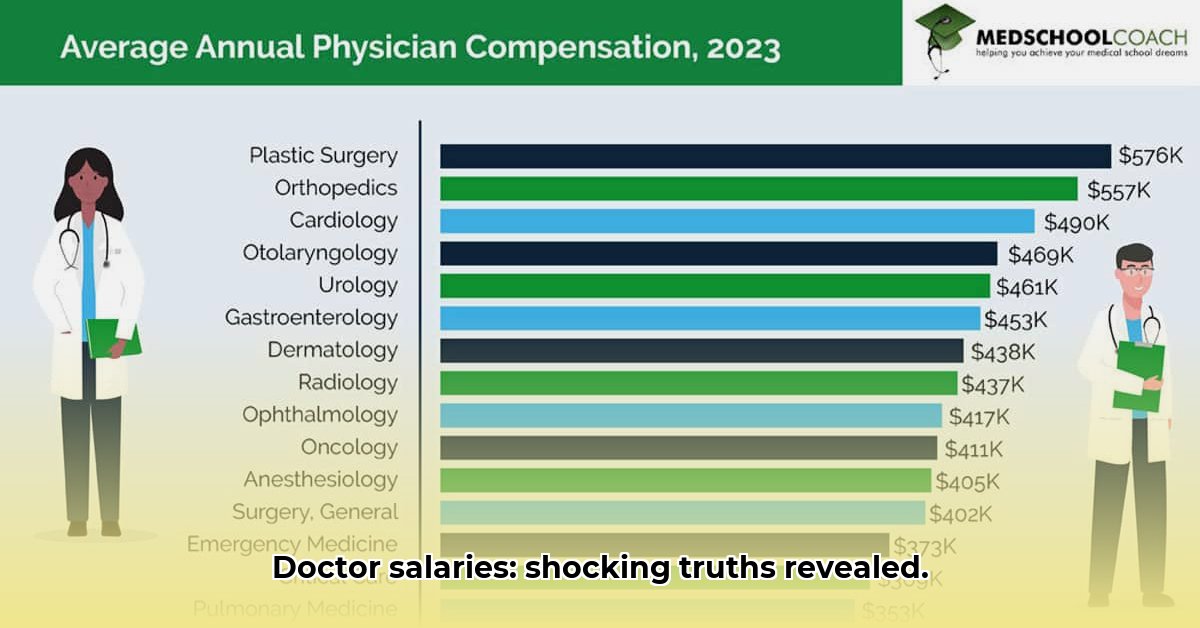
Average Net Worth of Doctors: A Specialty Breakdown
The gleaming image of a successful doctor often masks a stark reality: significant financial disparities exist across medical specialties. While some specialists accumulate substantial wealth, others, even those in crucial roles, struggle. This disparity isn't merely about annual salaries; it's about the long-term accumulation of assets and the resulting financial security. This article will explore the complex factors driving this inequality, offering insights and actionable steps for physicians at all career stages.
The Money Gap: Why Some Doctors Are Wealthier Than Others
Data reveals a striking wealth gap. High-earning specialists like plastic surgeons, orthopedic surgeons, and cardiologists often boast net worths exceeding $5 million, while family doctors and pediatricians frequently report considerably less, often under $500,000. Why this vast difference? The answer isn't as straightforward as a simple comparison of hourly rates. It's a complex interplay of several key factors.
Procedural vs. Patient-Care Focused Specialties: A Key Distinction
This disparity is partly explained by the fundamental difference between procedure-based and patient-care focused specialties. Surgeons and other procedure-heavy specialists generally command higher fees per service. While this isn't inherently unjust, it creates a significant cumulative wealth difference when compared to the income of physicians specializing in patient care and prevention.
Historical Trends and Systemic Inequalities
Beyond procedural income differences, historical inequities persist. Gender and racial disparities have resulted in lower salaries and fewer opportunities for women and doctors of color, significantly impacting long-term wealth accumulation. Ongoing research is crucial to fully understand these persistent inequalities and implement lasting solutions.
The Crushing Weight of Student Loan Debt
The staggering burden of student loan debt significantly impacts physician wealth. This debt can take decades to repay, delaying wealth accumulation for individuals in lower-paying specialties, further exacerbating existing disparities. Addressing this debt burden is vital for creating financial equity in medicine.
Market Fluctuations: A Wildcard for All
The unpredictable nature of financial markets also influences wealth accumulation. Even high-earning specialists are not immune to market downturns, underscoring the importance of sound financial planning and diversification strategies.
Gender and Racial Disparities: A Nuanced Perspective
While the gender and racial wealth gaps are undeniable, they are often smaller within medicine than in the broader population. This suggests that internal factors within the medical profession, such as specialty choice and career trajectory, play a significant role alongside external societal factors.
Steps Toward Financial Well-being: A Roadmap for Doctors
Navigating these complexities requires a proactive approach tailored to career stage.
For Medical Students:
- Prioritize Financial Literacy: Develop sound financial habits early, including budgeting, saving, and investing basics.
- Explore Specialty Choices Wisely: Consider both financial projections and personal career aspirations critically. Don't solely focus on income; consider long-term job satisfaction and lifestyle.
For Early-Career Physicians:
- Aggressively Manage Student Loan Debt: Develop a sustainable plan to repay loans strategically, perhaps exploring loan repayment programs.
- Invest Early and Consistently: Start investing as soon as feasible, even with small amounts. Time is a key factor in wealth building. Use professional financial advisors for planning and investment decisions.
For Established Physicians:
- Optimize Tax Strategies: Consult a tax professional to optimize tax strategies based on your personal circumstances.
- Prioritize Estate Planning: Protect your family's financial future. Develop a comprehensive strategy to safeguard assets and minimize potential burdens on heirs.
For Medical Organizations and Policy Makers:
- Promote Equitable Compensation: Advocate for fair compensation across specialties, recognizing the critical role of all medical professionals.
- Support Debt Relief Programs: Back initiatives that reduce or eliminate physician student loan debt.
- Invest in Research and Transparency: Support research to effectively identify and address factors driving wealth disparities, and encourage transparency in compensation practices.
Building a More Equitable Future
Addressing physician wealth disparities requires a multifaceted approach. By understanding the complex interplay of factors—from specialty choice to systemic inequalities—we can work toward a healthier, more equitable healthcare system. This isn't just about financial justice; it's about ensuring that every doctor's contribution is valued appropriately, leading to better patient care and healthier communities.